- Home
- Clive Barker
The Great and Secret Show Page 6
The Great and Secret Show Read online
Page 6
"You can try." A question came into the Jaff mind as he spoke, which Fletcher had begun to answer before the other had even voiced it.
"Why did I touch your body? I don't know. It demanded I did. I kept trying to shout it down, but it called."
He paused, then said:
"Maybe opposites attract, even in our condition."
"Then the sooner you're dead, the better," the Jaff said, and reached to tear out his enemy's throat.
In the darkness that was creeping over the Mission from the Pacific, Raul heard the first din of battle begin. He knew from echoes in his own Nunciate system that the distillation had been at work behind the walls. His father, Fletcher, had gone out of his own life and into something new. So had the other man, the one he'd always distrusted, even when words like evil were just sounds from a human palate. He understood them now; or at least put them together with his animal response to Jaffe: revulsion. The man was sick to his core, like fruit full of rot. To judge by the sound of violence from inside, Fletcher had decided to fight that corruption. The brief, sweet time he'd had with his father was over. There'd be no more lessons in civility; no more sitting together by the window, listening to "the sublime Mozart" and watching the clouds change shape.
As the first stars appeared, the sounds from the Mission ceased. Raul waited, hoping that Jaffe had been destroyed, but fearing his father had gone too. After an hour in the cold he decided to venture inside. Wherever they'd gone— Heaven or Hell—he couldn't follow. The best he could do was put on his clothes, which he'd always despised wearing (they chafed and caged) but which were now a reminder of his master's tuition. He'd wear them always, so as not to forget the Good Man Fletcher.
Reaching the door, he realized that the Mission had not been vacated. Fletcher was still there. So was his enemy. Both men still possessed bodies that resembled their former selves, but there was a change in them. Shapes hovered over each: a huge-headed infant, the color of smoke, over Jaffe; a cloud, with the sun somewhere in its cushion, over Fletcher. The men had their hands at each other's throats and eyes. Their subtle bodies were similarly intertwined. Perfectly matched, neither could gain victory.
Raul's entrance broke the impasse. Fletcher turned, his one good eye focusing on the boy, and in that instant the Jaff took his advantage, flinging his enemy back across the room.
"Out!" Fletcher yelled to Raul. "Get out!"
Raul did as he was ordered, darting between the dying fires as he raced from the Mission, the ground trembling beneath his bare soles as new furies were unleashed behind him. He had three seconds' grace to fling himself a little way down the slope before the leeway side of the Mission—walls which had been built to survive until the end of faith—shattered before an eruption of energy. He didn't cover his eyes against it. Instead he watched, glimpsing the forms of Jaffe and the Good Man Fletcher, twin powers locked together in the same wind, fly out from the center of the blast over his head, and away into the night.
The force of the explosion had scattered the bonfires. Hundreds of smaller fires now burned around the Mission. The roof had been almost entirely blown off. The walls bore gaping wounds.
Lonely already, Raul limped back towards his only refuge.
VI
THERE was a war waged in America that year, perhaps the bitterest and certainly the strangest ever fought on, in or above its soil. For the most part it went unreported, because it went unnoticed. Or rather its consequences (which were many, and often traumatic) seemed so unlike the effects of battle they were consistently misinterpreted. But then this was a war without precedent. Even the most crackpot prophets, the kind who annually predicted Armageddon, didn't know how to interpret the shaking of America's entrails. They knew something of consequence was afoot, and had Jaffe still been in the Dead Letter Room in the Omaha Post Office he would have discovered countless letters flying back and forth, filled with theories and suppositions. None, however—even from correspondents who'd known in some oblique fashion about the Shoal and the Art—came close to the truth.
Not only was the combat without precedent, but its nature developed as the weeks went by. The combatants had left the Misión de Santa Catrina with only a rudimentary understanding of their new condition and the powers that went with it. They soon explored and learned to exploit those powers, however, as the necessity of conflict threw their invention into overdrive. As he'd sworn, Fletcher willed an army from the fantasy lives of the ordinary men and women he met as he pursued Jaffe across the country, never giving him time to concentrate his will and use the Art he had access to. He dubbed these visionary soldiers hallucigenia, after an enigmatic species whose fossil remains recorded their existence five hundred and thirty million years previously. A family which, like the fantasies now named for them, bore no antecedents. These soldiers had lives barely longer than that of butterflies. They soon lost their particularity, becoming smoky and vague. But gossamer as they were, they several times carried the day against the Jaff and his legions, the terata, primal fears which Randolph now had the power to call forth from his victims, and make solid for a time. The terata were no less fleeting than the battalions shaped against them. In that, as in everything else, the Jaff and Good Man Fletcher were equally matched.
So it proceeded, in feints and counterfeints, pincer movements and sweeps, the intention of each army to slaughter the leader of the other. It was not a war the natural world took kindly to. Fears and fantasies were not supposed to take physical form. Their arena was the mind. Now they were solid, their combat raging across Arizona and Colorado, and into Kansas and Illinois, the order of things undone in countless ways by its passage. Crops were slow to show their shoots, preferring to stay in the earth rather than risk their tender heads when creatures in defiance of all natural law were abroad. Flocks of migrating birds, avoiding the paths of haunted thunderheads, came late to their resting grounds, or lost their way entirely and perished. There was in every state a trail of stampedes and gorings, the panicked response of animals who sensed the scale of the conflict being waged to extinction around them. Stallions set their sights on cattle and boulders, and gutted themselves mounting cars. Dogs and cats turned savage overnight, and were shot or gassed for the crime. Fish in quiet rivers tried to take to the land, knowing there was ambition in the air, and perished aspiring.
Fear in front and bedlam behind, the conflict ground to a halt in Wyoming, where the armies, too equally matched for anything but a war of attrition, fought each other to a complete standstill. It was the end of the beginning, or near it. The sheer scale of the energies required by Good Man Fletcher and the Jaff to create and lead these armies (no warlords these, by any stretch of the definition; they were merely men in hate with each other) had taken a terrible toll. Weakened to the point of near collapse they punched on like boxers who'd been battered into a stupor, but who fought because they knew no other sport. Neither would be satisfied until the other was dead.
On the night of July 16th the Jaff broke from the field of battle, shedding the remnants of his army as he made a dash for the southwest. His intended destination was the Baja. Knowing that the war against Fletcher could not be won under present conditions, he wanted access to the third vial of the Nuncio, with which he might re-invest his much diminished power.
Ravaged as he was, Fletcher gave chase. Two nights later, with a spurt of agility that would have impressed his much-missed Raul, he overtook the Jaff in Utah.
There they met, in a confrontation as brutal as it was inconclusive. Fuelled by a passion for each other's destruction which had long ago escalated beyond the issue of the Art and its possessing, and was now as devoted and as intimate as love, they fought for five nights. Again, neither triumphed. They beat and tore at each other, dark matched with bright, until they were barely coherent. When the Wind took them they lacked all power to resist it. What little strength remained they used to prevent one another from making a break for the Mission, and the sustenance there. The Wind carried the
m over the border into California, dropping them closer to the earth with every mile they covered. South-southeast over Fresno, and towards Bakersfield they travelled, until— on Friday, July 27th, 1971, their powers so depleted they could no longer keep themselves aloft—they fell in Ventura County, on the wooded edge of a town called Palomo Grove, during a minor electrical storm which brought not so much as a flicker to the roving searchlights and illuminated billboards of nearby Hollywood.
PART TWO
The League
of Virgins
I
____________ i ____________
THE girls went down to the water twice. The first time was the day after the rainstorm that had broken over Ventura County, shedding more water on the small town of Palomo Grove in a single night than its inhabitants might have reasonably expected in a year. The downpour, however monsoonal, had not mellowed the heat. With what little wind there was coming off the desert, the town baked in the high nineties. Children who'd exhausted themselves playing in the heat through the morning wailed away the afternoon indoors. Dogs cursed their coats; birds declined to make music. Old folks took to their beds. Adulterers did the same, dressed in sweat. Those unfortunates with tasks to perform that couldn't be delayed until evening, when (God willing) the temperature dropped, went about their labors with their eyes to the shimmering sidewalks, every step a trial, every breath sticky in their lungs.
But the four girls were used to heat; it was at their age the condition of the blood. Between them, they had seventy years' life on the planet, though when Arleen turned nineteen the following Tuesday, it would be seventy-one. Today she felt her age; that vital few months that separated her from her closest friend, Joyce, and even further from Carolyn and Trudi, whose mere seventeen was an age away for a mature woman like herself. She had much to tell on the subject of experience that day, as they sauntered through the empty streets of Palomo Grove. It was good to be out on a day like this, without being ogled by the men in the town—they knew them all by name—whose wives had taken to sleeping in the spare room; or their sexual banter being overheard by one of their mothers' friends. They wandered, like Amazons in shorts, through a town taken by some invisible fire which blistered the air and turned brick into mirage but did not kill. It merely laid the inhabitants stricken beside their open fridges.
"Is it love?" Joyce asked Arleen.
The older girl had a swift answer.
"Hell no," she said. "You are so dumb sometimes."
"I just thought . . . with you talking about him that way."
"What do you mean: that way?"
"Talking about his eyes and stuff."
"Randy's got nice eyes," Arleen conceded. "But so's Marty, and Jim, and Adam—"
"Oh stop, " said Trudi, with more than a trace of irritation. "You're such a slut."
"I am not."
"So stop it with the names. We all know that boys like you. And we all know why."
Arleen threw her a look which went unread given that all but Carolyn were wearing sunglasses. They walked on a few yards in silence.
"Anyone want a Coke?" Carolyn said. "Or ice cream?" They'd come to the bottom of the hill. The Mall was ahead, its air-conditioned stores tempting.
"Sure," said Trudi, "I'll come with you." She turned to Arleen. "You want something?"
"Nope."
"Are you sulking?"
"Nope."
"Good," said Trudi. " 'Cause it's too hot to argue." The two girls headed into Marvin's Food and Drug, leaving Arleen and Joyce on the street corner.
"I'm sorry . . ." Joyce said.
"What about?"
"Asking you about Randy. I thought maybe you . . . you know . . . maybe it was serious."
"There's no one in the Grove that's worth two cents," Arleen murmured. "I can't wait to get out."
"Where will you go? Los Angeles?"
Arleen pulled her sunglasses down her nose and peered at Joyce.
"Why would I want to do that?" she said. "I've got more sense than to join the line there. No. I'm going to New York. It's better to study there. Then work on Broadway. If they want me they can come and get me."
"Who can?"
"Joyce, " Arleen said, mock-exasperated. "Hollywood."
"Oh. Yeah. Hollywood."
She nodded appreciatively at the completedness of Arleen's plan. She had nothing in her own head anywhere near so coherent. But it was easy for Arleen. She was California Beautiful, blonde, blue-eyed and the envied possessor of a smile that brought the opposite sex to their knees. If that weren't advantage enough she had a mother who'd been an actress, and already treated her daughter like a Star.
Joyce had no such blessings. No mother to pave the way, no glamour to get her through the bad times. She couldn't even drink a Coke without getting acne. Sensitive skin, Doctor Briskman kept saying, you'll grow out of it. But the promised transformation was like the end of the world that the Reverend talked about on a Sunday; delayed and delayed.
With my luck, Joyce thought, the day I lose my zits and get my tits is the day the Reverend's right. I'll wake up perfect, open the curtains, and the Grove will be gone. I'll never get to kiss Randy Krentzman.
There, of course, lay the real reason behind her close questioning of Arleen. Randy was in Joyce's every thought, or every other, though she'd only met him three times and spoken to him twice. She'd been with Arleen during the first encounter, and Randy had scarcely looked her way when she was introduced, so she'd said nothing. The second occasion she'd not had any competition, but her friendly hello had been greeted with an off-hand: "Who are you?" She'd persisted; reminded him; even told him where she lived. On the third meeting ("Hello again," she'd said. "Do I know you?" he'd replied), she'd recited all her personal details shamelessly; even asked him, in a sudden rush of optimism, if he was a Mormon. That, she'd later decided, had been a tactical error. Next time she'd use Arleen's approach, and treat the boy as though his presence was barely endurable; never look at him; only smile if it was absolutely necessary. Then, when you were about to saunter away look straight into his eyes, and purr something vaguely dirty. The law of mixed messages. It worked for Arleen, why not for her? And now that the great beauty had publicly announced her indifference to Joyce's idol she had some sliver of hope. If Arleen had been seriously interested in Randy's affections then Joyce might have gone right around to the Reverend Meuse and asked him if he could hurry the Apocalypse up a little.
She took off her glasses and squinted up at the white hot sky, vaguely wondering if it was already on its way. The day was strange.
"Shouldn't do that," Carolyn said, emerging from Marvin's Food and Drug with Trudi following, "the sun'll burn out your eyes."
"It will not."
"It will so," Carolyn, ever the source of unwanted information, replied, "your retina's a lens. Like in a camera. It focuses—"
"All right," Joyce said, returning her gaze to solid ground. "I believe you." Colors cavorted behind her eyes for a few moments, disorienting her.
"Where now?" said Trudi.
"I'm going back home," Arleen said. "I'm tired."
"I'm not," Trudi said brightly. "I'm not going home, either. It's boring."
"Well it's no use standing in the middle of the Mall," Carolyn said. "That's as boring as being at home. And we'll cook in the sun."
She looked roasted already. The heaviest of the four by twenty pounds or more, and a redhead, the combination of her weight, and skin that never tanned, should have driven her indoors. But she seemed indifferent to the discomfort, as she was to every other physical stimulus but that of taste. The previous November the entire Hotchkiss family had been involved in a freeway pile-up. Carolyn had crawled free of the wreckage, slightly concussed, and had subsequently been found by the police some way down the freeway, with half-chewed Hershey bars in both hands. There was more chocolate on her face than blood, and she'd screamed blue murder—or so rumor went—when one of the cops attempted to dissuade her from her snack.
Only later was it discovered that she'd sustained half a dozen cracked ribs.
"So where?" said Trudi, returning to the burning issue of the day. "In this heat: where?"
"We'll just walk," said Joyce. "Maybe down to the woods. It'll be cooler there." She glanced at Arleen. "Are you coming?"
Arleen made her companions hang on her silence for ten seconds. Finally she agreed.
"Nowhere better to go," she said.
____________ ii ____________
Most towns, however small, make themselves after the pattern of a city. That is, they divide. White from black, straight from gay, wealthy from less wealthy, less wealthy from poor. Palomo Grove, the population of which was in that year, 1971, a mere one thousand two hundred, was no exception. Built on the flanks of a gently sloping hillside, the town had been designed as an embodiment of democratic principles, in which every occupant was intended to have equal access to the center of power in the town, the Mall. It lay at the bottom of Sunrise Hill, known simply as the Hill, with four villages—Stillbrook, Deerdell, Laureltree and Windbluff—radiating from its hub, their feed thoroughfares aligned with the compass points. But that was as far as the planners' idealism went. Thereafter the subtle differences in the geography of the villages made each quite different in character. Wind-bluff, which lay on the southwest flank of the hill, commanded the best views, and its properties the highest prices. The top third of the Hill was dominated by half a dozen grand residences, their roofs barely visible behind lush foliage. On the lower slopes of this Olympus were the Five Crescents, streets bowed upon themselves, which were—if you couldn't afford a house at the very top—the next most desirable places to live.
By contrast, Deerdell. Built on flat ground, and flanked on two sides by undeveloped woodland, this quadrant of the Grove had rapidly gone downhill. Here the houses lacked pools and needed paint. For some, the locale was a hip retreat. There were, even in 1971, a few artists living in Deerdell; that community would steadily grow. But if there was anywhere in the Grove where people went in fear for their automobiles' paintwork, it was here.

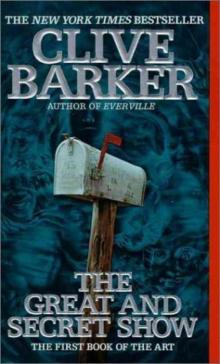 The Great and Secret Show
The Great and Secret Show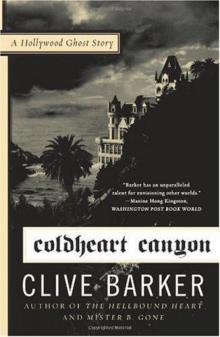 Coldheart Canyon: A Hollywood Ghost Story
Coldheart Canyon: A Hollywood Ghost Story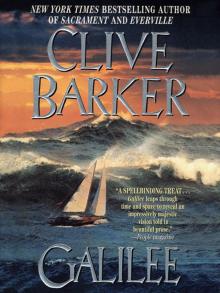 Galilee
Galilee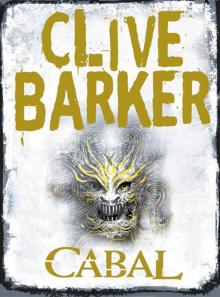 Cabal
Cabal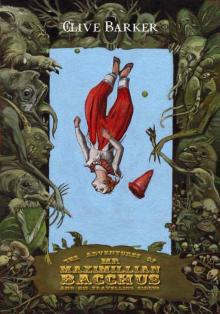 The Adventures of Mr. Maximillian Bacchus and His Travelling Circus
The Adventures of Mr. Maximillian Bacchus and His Travelling Circus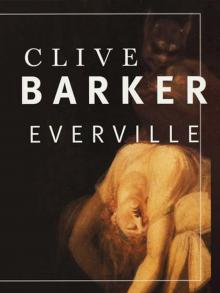 Everville
Everville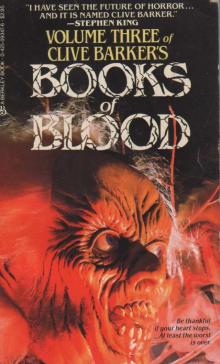 Books of Blood: Volume Three
Books of Blood: Volume Three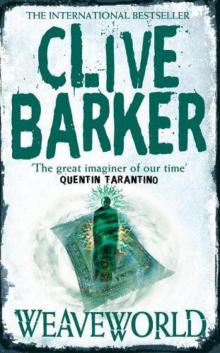 Weaveworld
Weaveworld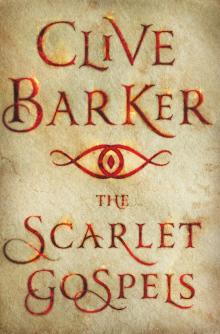 The Scarlet Gospels
The Scarlet Gospels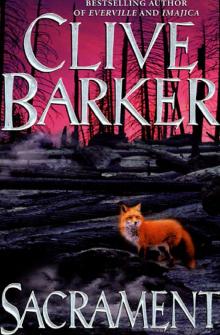 Sacrament
Sacrament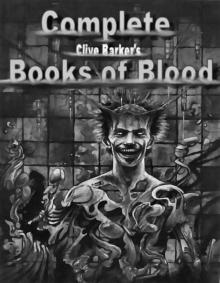 Books of Blood: Volumes 1-6
Books of Blood: Volumes 1-6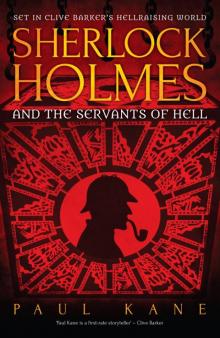 Sherlock Holmes and the Servants of Hell
Sherlock Holmes and the Servants of Hell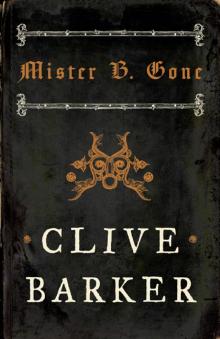 Mister B. Gone
Mister B. Gone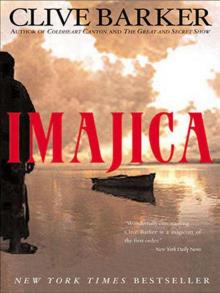 Imajica
Imajica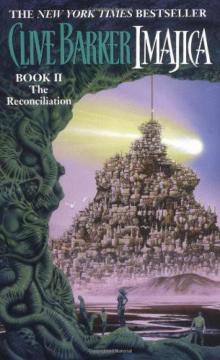 The Reconciliation
The Reconciliation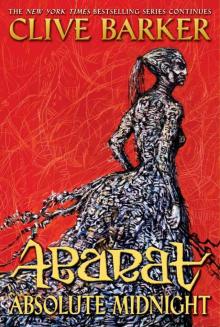 Abarat
Abarat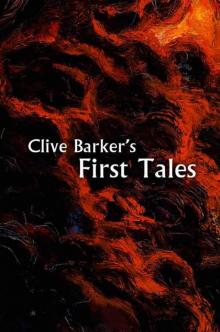 Clive Barker's First Tales
Clive Barker's First Tales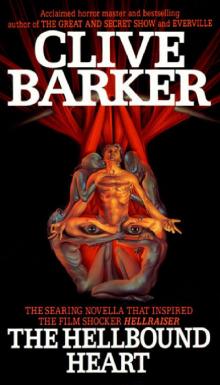 The Hellbound Heart
The Hellbound Heart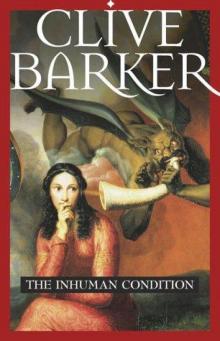 The Inhuman Condition
The Inhuman Condition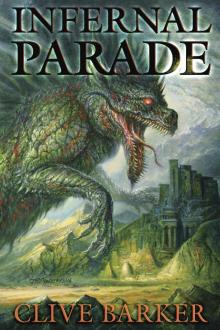 Infernal Parade
Infernal Parade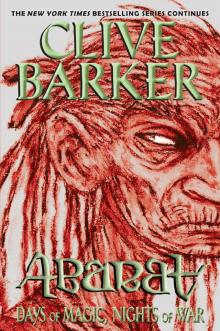 Days of Magic, Nights of War
Days of Magic, Nights of War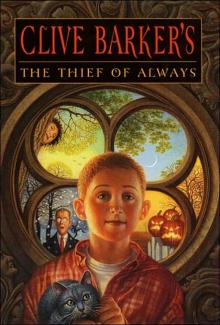 The Thief of Always
The Thief of Always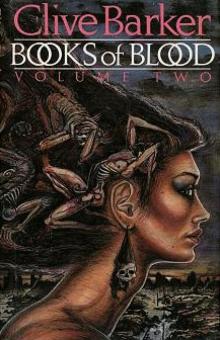 Books of Blood Vol 2
Books of Blood Vol 2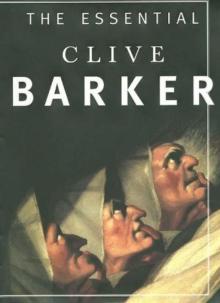 The Essential Clive Barker
The Essential Clive Barker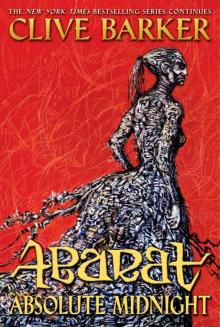 Abarat: Absolute Midnight a-3
Abarat: Absolute Midnight a-3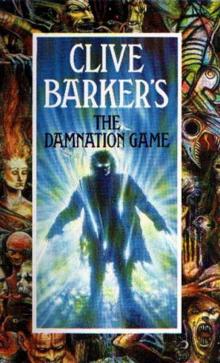 The Damnation Game
The Damnation Game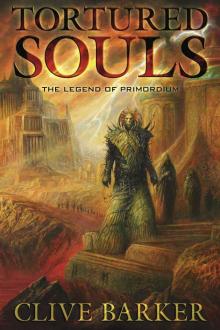 Tortured Souls: The Legend of Primordium
Tortured Souls: The Legend of Primordium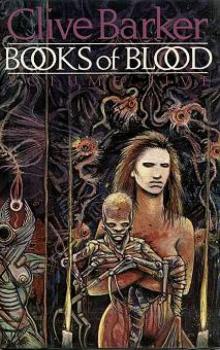 Books of Blood Vol 5
Books of Blood Vol 5 Imajica 02 - The Reconciliator
Imajica 02 - The Reconciliator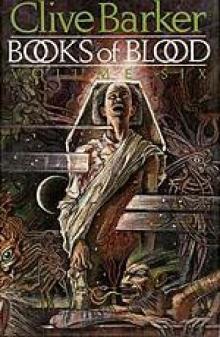 Books Of Blood Vol 6
Books Of Blood Vol 6 Imajica 01 - The Fifth Dominion
Imajica 01 - The Fifth Dominion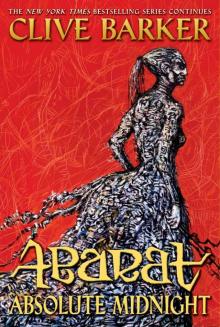 Abarat: Absolute Midnight
Abarat: Absolute Midnight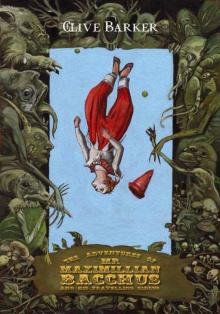 The Adventures of Mr. Maximillian Bacchus & His Traveling Circus
The Adventures of Mr. Maximillian Bacchus & His Traveling Circus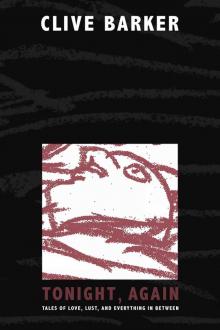 Tonight, Again
Tonight, Again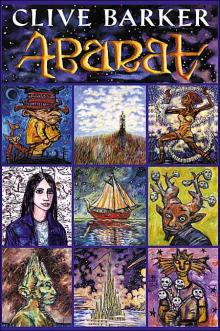 Abarat: The First Book of Hours a-1
Abarat: The First Book of Hours a-1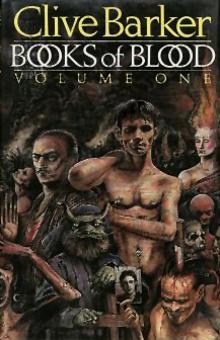 Books Of Blood Vol 1
Books Of Blood Vol 1 Age of Desire
Age of Desire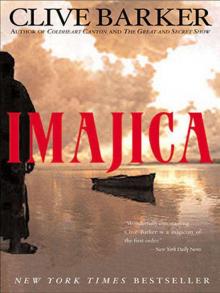 Imajica: Annotated Edition
Imajica: Annotated Edition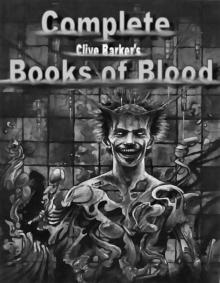 Complete Books of Blood
Complete Books of Blood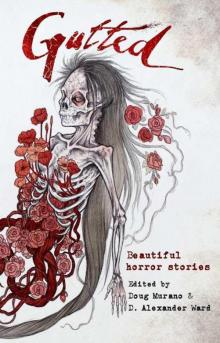 Gutted: Beautiful Horror Stories
Gutted: Beautiful Horror Stories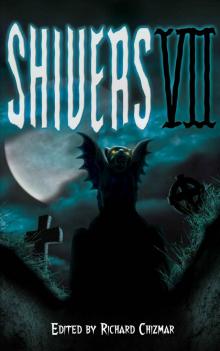 Shivers 7
Shivers 7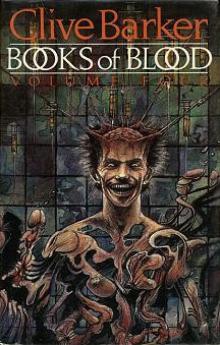 Books Of Blood Vol 4
Books Of Blood Vol 4